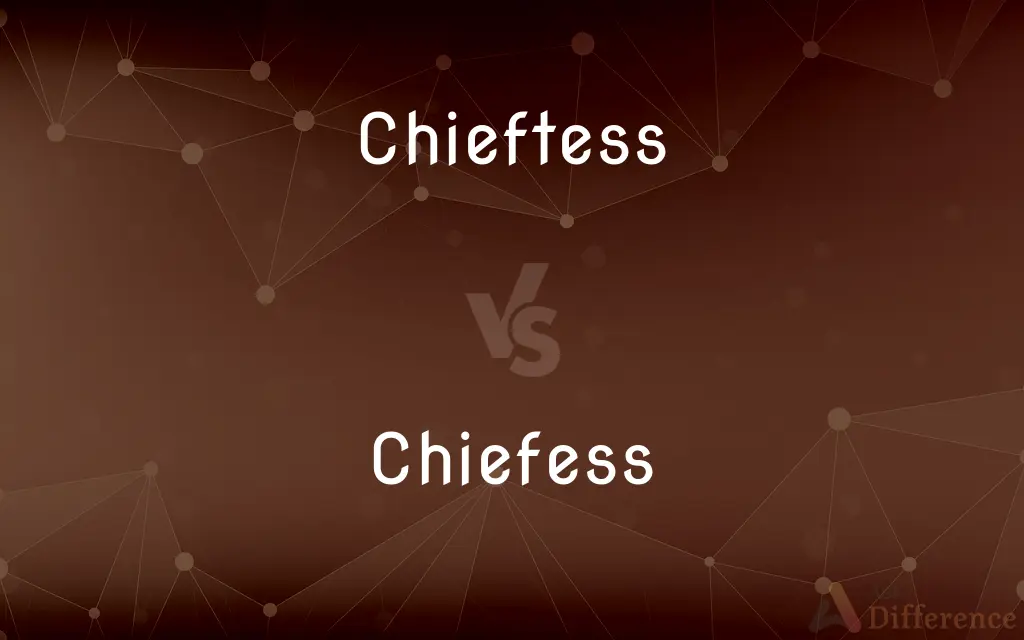Chieftess vs. Chiefess — What's the Difference?
Edited by Tayyaba Rehman — By Maham Liaqat — Updated on April 24, 2024
"Chieftess" and "chiefess" are both terms used to denote a female leader, often of a tribe or clan, but "chieftess" is more commonly used and recognized in modern usage.

Difference Between Chieftess and Chiefess
Table of Contents
ADVERTISEMENT
Key Differences
Both "chieftess" and "chiefess" refer to a woman holding a position of authority, traditionally within tribal or clan-based societies. The terms are similar in meaning but differ slightly in their usage and familiarity. "Chieftess" is more frequently encountered in contemporary texts and discussions, perhaps because of its clearer linguistic connection to the word "chief."
The role of a chieftess or chiefess typically involves leadership, decision-making, and maintaining social order within her community. While "chieftess" is the more commonly used term today, "chiefess" may appear in historical or specific cultural contexts, particularly in reference to the female counterparts of chiefs recognized in various indigenous cultures.
In terms of linguistic structure, "chieftess" directly adds the feminine suffix "-ess" to the end of "chief," making it straightforward and easily understood. "Chiefess," while also adding "-ess," might be seen as slightly less intuitive due to the addition of an extra syllable, which could affect its usage.
From a cultural standpoint, both titles respect the authority and governance roles that women can hold in various societies. They symbolize power, responsibility, and respect, reflecting the gendered nuances of leadership titles in different languages and cultures.
Despite their similarities, the choice between "chieftess" and "chiefess" can depend on regional preferences, historical context, or specific cultural practices, which dictate how female leaders are addressed or recognized within their communities.
ADVERTISEMENT
Comparison Chart
Common Usage
More commonly used and recognized
Less common, may appear in historical contexts
Linguistic Structure
Direct feminine form of "chief"
Feminine form with an extra syllable
Cultural Context
Used broadly across various cultures
Usage can be specific to certain cultures or historical texts
Role
Leadership and governance
Leadership and governance
Symbolism
Power, responsibility, respect
Power, responsibility, respect
Compare with Definitions
Chieftess
Holds authority in social and ceremonial roles.
As chieftess, she presided over the annual harvest festival.
Chiefess
Often involved in governance and decision-making.
The chiefess convened a council to discuss the matter.
Chieftess
Inherits or is elected into her position.
She became chieftess following the longstanding tradition of her tribe.
Chiefess
Symbolizes matriarchal power in her community.
The chiefess has a significant influence in community matters.
Chieftess
A respected figure within her society.
The chieftess is revered for her fair and just leadership.
Chiefess
A female equivalent of a chief in certain cultures.
The chiefess was known for her diplomatic skills.
Chieftess
Represents her community in external affairs.
The chieftess negotiated peace with neighboring tribes.
Chiefess
May have a ceremonial role in addition to leadership.
The chiefess performed the rites during the cultural ceremony.
Chieftess
A female leader of a tribe or group.
The chieftess led her people through the crisis with wisdom and courage.
Chiefess
An emblem of female authority and respect.
The chiefess's decisions are respected by all her people.
Chieftess
Syn of chieftainess: a female chieftain.
Chiefess
A woman chief, especially in traditional Hawaiian society.
Chiefess
(Hawaii) chieftainess, a female chief.
Common Curiosities
How is a chieftess chosen in tribal societies?
The selection of a chieftess can vary, often involving inheritance, election, or appointment based on specific tribal laws and customs.
Do modern societies use the terms chieftess or chiefess?
These terms are more commonly found in contexts referring to traditional or historical roles rather than in modern political or corporate leadership roles.
What cultural significance does a chieftess hold?
A chieftess holds cultural significance as a leader and symbol of authority and tradition within her community.
Is chiefess a valid English word?
Yes, chiefess is a valid term but is less commonly used than chieftess to describe a female chief.
Can both chieftess and chiefess be used interchangeably?
While they can be used interchangeably in many contexts, the choice of term may depend on regional or cultural preferences.
What are the typical responsibilities of a chieftess or chiefess?
Responsibilities typically include leading the community, making strategic decisions, overseeing ceremonies, and representing the group in external affairs.
What does chieftess mean?
A chieftess is a female leader, often of a tribe or clan, who holds significant authority and responsibility.
How are disputes handled by a chieftess?
A chieftess may handle disputes through mediation, council meetings, or traditional forms of justice, depending on cultural norms.
Is there a modern equivalent to a chieftess or chiefess in today's governments?
In modern contexts, equivalent roles might be referred to as president, governor, or chairperson, depending on the structure and nature of the leadership position.
What historical records exist of chieftesses or chiefesses?
Historical records, including texts, artifacts, and oral histories, often highlight the roles and contributions of female leaders in various cultures throughout history.
Share Your Discovery

Previous Comparison
Build vs. Built
Next Comparison
Unuse vs. DisuseAuthor Spotlight
Written by
Maham LiaqatEdited by
Tayyaba RehmanTayyaba Rehman is a distinguished writer, currently serving as a primary contributor to askdifference.com. As a researcher in semantics and etymology, Tayyaba's passion for the complexity of languages and their distinctions has found a perfect home on the platform. Tayyaba delves into the intricacies of language, distinguishing between commonly confused words and phrases, thereby providing clarity for readers worldwide.
















































